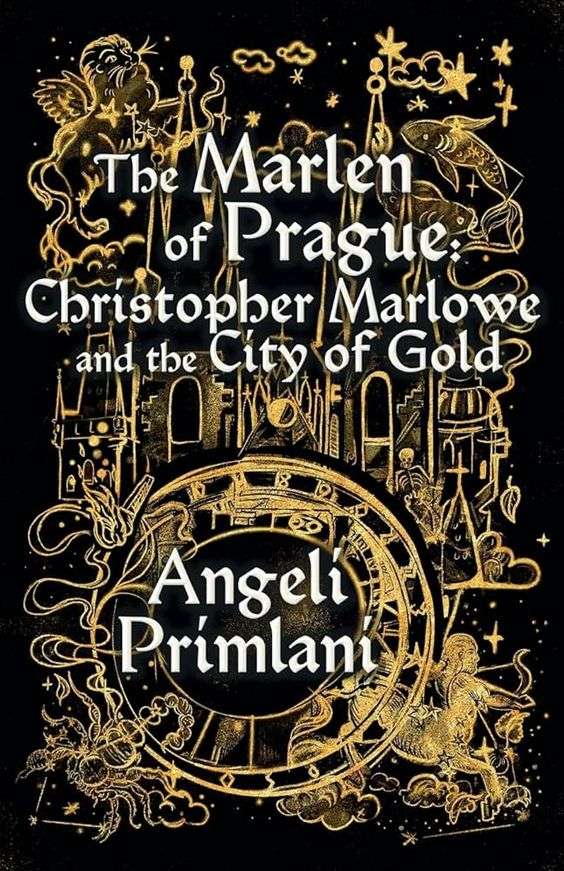We’ve implemented some new protocols around sending us messages via this website. Please email website “at” britishfantasysociety “dot” org for any issues.

For all things fantasy, horror, and speculative fiction
-
Announcement:

The Marlen of Prague
THE MARLEN OF PRAGUE: Christopher Marlow and the City of Gold by Angeli Primani
THE MARLEN OF PRAGUE: Christopher Marlow and the City of Gold by Angeli Primani
Guardbridge Books, pb, £11.99
Reviewed by Pauline Morgan

Some authors give themselves very difficult challenges. To write in a historical period requires a lot of research. Fudging, or being vague about a period of history, is fraught with pitfalls. There is always the reader who knows more than the writer and who is very happy to point out mistakes. An added challenge is to get the geography right. While the countryside and villages remain relatively unchanged for centuries, cities do not. To set a novel in a 16th-century city means stripping out everything that has been built since. In a city like Prague, which still has many of its ancient buildings, it is easier but still requires a lot of research, even if the author is familiar with the present-day city. The average reader can only assume that the author has done a thorough job. Angeli Primani set her novel in both 16th-century Elizabethan London and the Prague of the same period.
There were many rumours about the fate of the playwright Christopher Marlow. Though it is generally accepted that he was murdered in a tavern brawl in Deptford, it has been suggested that his death was faked. Also, he was a spy. Primani has taken these rumours and run with them. Her Kit Marlowe is the lover of another playwright, Thomas Kyd. On the night when the Spanish Armada is sighted, Marlowe is summoned to Greenwich, a part of a cabal, to perform a magical rite that summons a storm to drive the ships off course. The action shifts the course of history sideways. Thomas is arrested for heresy because of papers Marlowe inadvertently left in his room.
A backlash of deflecting the Spanish Armada results in Marlowe’s death being faked and the English Secret Service sending him to Prague to find John Dee, who has disappeared. He is reluctant, but the life of his sister Anne will be at stake if he doesn’t accept the mission. It will also mean that he will never be able to return to England.
The journey to Prague slows the pace of the novel but introduces us to Edwin, who accompanies Marlowe to make sure he doesn’t stray off mission, and a troupe of actors who provide cover for him. Once they arrive, the situation immediately gets more complicated, especially as the Emperor, Rudolf II wants to use the spell that deflected the Armada for his own purposes. Marlowe does not think this is a good idea and resists it.
While a lot of the events are details of recorded history, there are differences, such as William Shakespeare turning up in Prague. Since magic is involved within the novel, these could be explained by the spell-changing aspects of our version of our history.
Overall, this is an enjoyable tale, but it is disappointing that the author has ended it so that it seems unlikely for a sequel to continue the adventures of the spy Kit Marlowe. To have had that prospect would have been a bonus.
Explore the blog:
Blog categories:
Latest Posts:
Tags:
#featured (56) #science fiction (25) Book Review (264) events (44) Fantasy (231) Graphic Novel (13) horror (136) Members (62) Orbit Books (48) profile (43) Romance (17) Science Fiction (50) short stories (28) Titan Books (52) TV Review (15)
All reviews
Latest Reviews:
- THE HOUSE ON THE BORDERLAND by William Hope Hodgson
- Monstrum by Lottie Mills
- Mood Swings by Dave Jeffery
- Yoke of Stars by R.B. Lemberg
- Hera by Jennifer Saint
- The Black Bird Oracle by Deborah Harkness
- RETURN OF THE DWARVES By Markus Heitz
- Delicious in Dungeon
- Toxxic by Jane Hennigan
- THIS ISLAND EARTH: 8 FEATURES FROM THE DRIVE-IN By Dale Bailey
Review tags:
#featured (2) Action (4) Adventure (4) Book Review (28) Fantasy (18) Featured (2) Feminist (2) Gothic Horror (3) Horror (14) Magic (3) Orbit Books (3) Romance (6) Science Fiction (5) Swords and Sorcery (2) Titan Books (7)